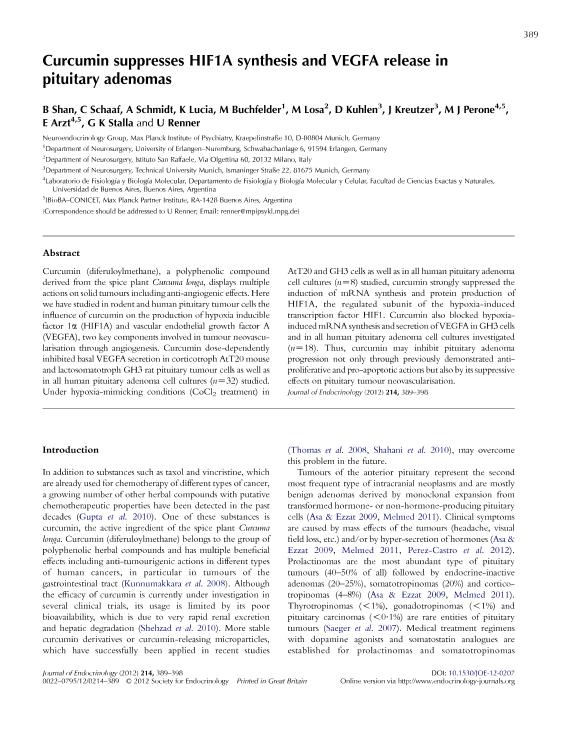Artículo
Curcumin suppresses HIF1A synthesis and VEGFA release in pituitary adenomas
Shan, B.; Schaaf, C.; Schmidt, A.; Lucia, K.; Buchfelder, M.; Losa, M.; Kuhlen, D.; Kreutzer, J.; Perone, Marcelo Javier ; Arzt, Eduardo Simon
; Arzt, Eduardo Simon ; Stalla, G.K.; Renner, U.
; Stalla, G.K.; Renner, U.
 ; Arzt, Eduardo Simon
; Arzt, Eduardo Simon ; Stalla, G.K.; Renner, U.
; Stalla, G.K.; Renner, U.
Fecha de publicación:
09/2012
Editorial:
BioScientifica
Revista:
Journal of Endocrinology
ISSN:
0022-0795
Idioma:
Inglés
Tipo de recurso:
Artículo publicado
Clasificación temática:
Resumen
Curcumin (diferuloylmethane), a polyphenolic compound derived from the spice plant Curcuma longa, displays multiple actions on solid tumours including anti-angiogenic effects. Here we have studied in rodent and human pituitary tumour cells the influence of curcumin on the production of hypoxia inducible factor 1α (HIF1A) and vascular endothelial growth factor A (VEGFA), two key components involved in tumour neovascularisation through angiogenesis. Curcumin dose-dependently inhibited basal VEGFA secretion in corticotroph AtT20 mouse and lactosomatotroph GH3 rat pituitary tumour cells as well as in all human pituitary adenoma cell cultures (nZ32) studied. Under hypoxia-mimicking conditions (CoCl2 treatment) in AtT20 and GH3 cells as well as in all human pituitary adenoma cell cultures (nZ8) studied, curcumin strongly suppressed the induction of mRNA synthesis and protein production of HIF1A, the regulated subunit of the hypoxia-induced transcription factor HIF1. Curcumin also blocked hypoxiainducedmRNAsynthesis and secretion ofVEGFAinGH3 cells and in all human pituitary adenoma cell cultures investigated (nZ18). Thus, curcumin may inhibit pituitary adenoma progression not only through previously demonstrated antiproliferative and pro-apoptotic actions but also by its suppressive effects on pituitary tumour neovascularisation.
Palabras clave:
Pituitary
,
Adenoma
,
Curcumin
,
Angiogenesis
Archivos asociados
Licencia
Identificadores
Colecciones
Articulos(IBIOBA - MPSP)
Articulos de INST. D/INV.EN BIOMED.DE BS AS-CONICET-INST. PARTNER SOCIEDAD MAX PLANCK
Articulos de INST. D/INV.EN BIOMED.DE BS AS-CONICET-INST. PARTNER SOCIEDAD MAX PLANCK
Citación
Shan, B.; Schaaf, C.; Schmidt, A.; Lucia, K.; Buchfelder, M.; et al.; Curcumin suppresses HIF1A synthesis and VEGFA release in pituitary adenomas; BioScientifica; Journal of Endocrinology; 214; 3; 9-2012; 389-398
Compartir
Altmétricas



